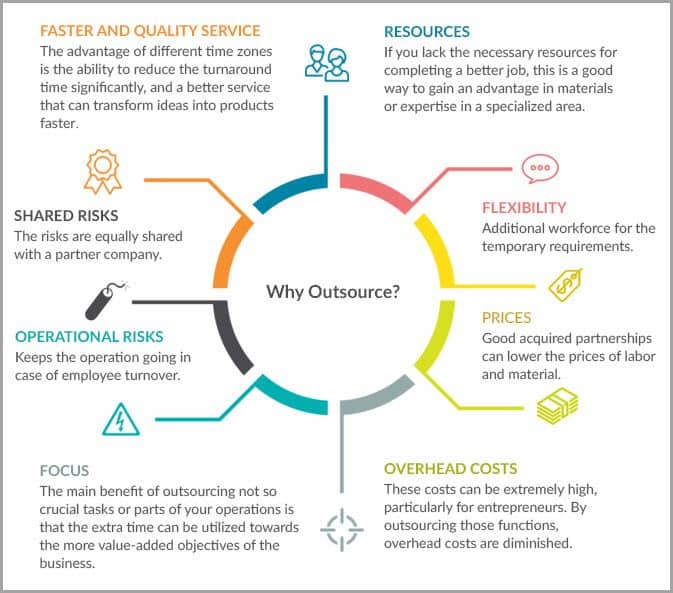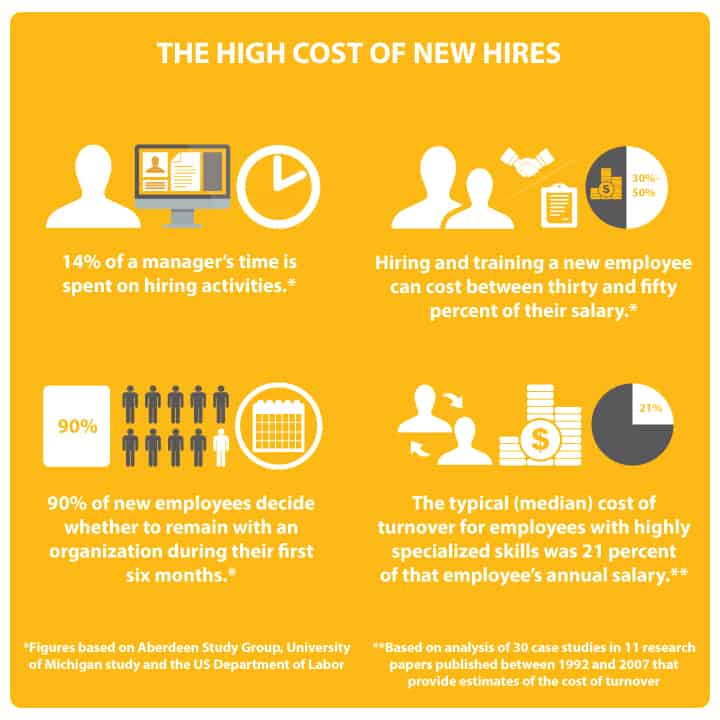For many eCommerce businesses, the advantage of outsourcing specific responsibilities and tasks are not an optimization strategy – they’re a necessity. Often the only feasible way to grow your business, launch a product, or manage operations is to delegate certain tasks to an outside agency, freelancer, or BPO.
Simply put, outsourcing is the process of using third-party service providers to handle certain business functions.
This isn’t a new trend either. The outsourcing industry has been around since late 80s and early 90s to combat rising labour costs and an increasingly global marketplace.
At one time, outsourcing services were limited to large, multinational corporations. But today businesses of all sizes can realize the benefits of outsourcing.
In this post, we’re going to share what you should and shouldn’t outsource along with some key benefits.

Article Contents
What Should You Outsource?
The best processes and tasks to outsource are ones that take a ton of time to execute and aren’t a core competency of your team.
For example, the first function many eCommerce businesses outsource is accounting and bookkeeping. If you aren’t an accountant, managing your own accounts can be time-consuming and take away valuable time from working on more important tasks in the business. Not to mention, if you get it wrong, you can wind up with compliance and tax issues.
Other common tasks to outsource is customer support, order fulfillment, and writing, just to name a few.
With the right processes in place, you can outsource nearly any aspect of your business. However, it is generally a best practice to retain any part of the business in-house that are a core competency or competitive advantage.
5 benefits of outsourcing specific processes
1. Focus on your core business practice
It’s more efficient to spend your time doing whatever you’re good at.
If you’re great at business development and structuring partnership deals to expand your eCommerce business, then you should spend more time doing that.
But there are plenty of tasks on your plate that don’t play to your skills. Maybe you aren’t very good at managing your finances, performing customer service, or filling out all that human resources paperwork. Every minute you work on tasks outside of your skillset is time spent inefficiently.
“Most entrepreneurs have great talents, but many times they think they can do it all,” says Laura Lee Sparks, owner of an outsourcing firm for attorneys. “That can really stall the growth of the business. By outsourcing the day-to-day back-office tasks, the business owner has more time to focus on generating income.”
Your biggest cost savings, in terms of saving money, time, and stress, is to outsource things that aren’t tied to your strengths.
2. Reduce labor costs
Hiring and training full-time skilled workers is expensive, especially for shorter-term projects.
When you outsource, you convert fixed labour costs into variable costs, meaning you only pay for the services you consume. This gives you staffing flexibility that just doesn’t exist with in-house employees.
Outsourcing allows you to tailor your service consumption to your needs. You only pay for what you use and can seamlessly scale your consumption when business picks up or slows down.
For instance, you probably don’t need a full-time in-house CFO when you are doing under $10 million in annual revenue. It’s an important job that can’t be ignored, but you don’t have enough work to justify a full-time salary.
By hiring a fractional or virtual CFO, you only pay for the service you consume but retain the reliability of a dedicated employee.
3. Control cash flow
When you outsource, you convert a fixed cost (a full-time salary) into a variable cost (a pay-what-you-need service). This frees up your cash flow for investment in other parts of your business.
For example, back-office tasks typically come with their own expenses like office space, furniture, copier paper, etc. Even remote teams come with costs, like equipment and access to software tools. These expenses don’t seem like much, but they add up quickly.
You may be able to squeeze one person into your current office, but if hiring that new assistant means moving to a bigger (and more expensive) space, it may be cheaper to hire a virtual assistant agency to meet your needs. Yes, the outsourcer technically builds their costs into the fees they charge, but those overhead costs are spread out across all of their customers.
You could funnel the cash you save into improving your products or running marketing programs. This is especially useful at the early stages of new projects, like launching a new product or reaching into a new business vertical.
4. Access top talent
Hiring a new team member often requires expensive recruiting and training. You have to teach them your processes and workflows (or develop special processes just for them). If your team isn’t async-first, there is also the sunk cost of being in a lot of extra meetings and/or Zoom calls.
When you work with an agency, consultant, or freelancer, they all come with specialist knowledge. (Or, at least they should)
Furthermore, they likely have access to skills and tools you may not need today but will someday. If they don’t have someone on staff who can solve your problem, they likely have a network of specialists with complementary skills they can pull from. You don’t have that sort of flexibility with in-house employees.
For example, let’s say you have a designer on your team, but he specializes in print materials. He’ll whip up a great brochure, but he doesn’t know much about digital products.
When it comes time for a new website, your designer won’t be much help. If you outsource your design work to a creative agency, however, you will have access to designers with a broad range of skills.

Outsourcers come with specialist knowledge, expertise and experience you couldn’t afford to hire on your own. The outsourcer is responsible for any licenses or accreditation that the work requires. By focusing on their specialty, outsources stay abreast of industry changes and trends, learn new techniques, and constantly develop their skills.
Furthermore, outsourcers have access to skills and tools you may not need today but will someday. If they don’t have someone on staff who can solve your problem, they likely have a network of specialists with complementary skills they can pull from. You don’t have that sort of flexibility with in-house employees.
For example, let’s say you have a designer on your team, but he specializes in print materials. He’ll whip up a great brochure, but he doesn’t know much about digital products.
When it comes time for a new website, your designer won’t be much help. If you outsource your design work to a creative agency, however, you will have access to designers with a broad range of skills.
5. Retain your full-time employees
Employee turnover is painful, especially these days. When someone quits, all that money you spent on hiring and training walk out the door with them. Turnover at the wrong time (and is there ever a right time?) can disrupt business operations and add more stress to your team.
Outsourcing helps in two ways:
- As your team levels up, you can promote them (with a raise and new responsibilities) and then delegate the repetitive processes and tasks.
- Delegating also adds a layer of consistency in your business. For example, if your full-time customer support manager quits, you will need to back-fill the role. However, if you have 3-4 freelance support reps handling tickets, you have the time to find a great new manager instead of having to do all of the support yourself for a period of time.
3 disadvantages of outsourcing
Now that you know many of the advantages, we also need to take a brief look at a few cons of outsourcing (and how to mitigate the risk).
1. Exposed confidential data
When certain aspects of a business are outsourced, such as HR, payroll, and recruitment services, there is a risk involved because confidential company information is revealed to a third party.
You can mitigate these risks to a certain degree by carefully vetting any agencies or vendors, making sure they follow cybersecurity best practices, and having your own safeguards in place.
For instance, the person who is in charge of updating your chart of accounts should not be the same person who is in charge of approving bank transfers and payments.
2. Synchronizing deliverables
Some businesses may be facing longer delivery timeframes, less than ideal quality output and the wrong categorization of certain responsibilities. If you find yourself in a situation like this, it may be useful to hire a full-time project manager or bring certain problematic areas of the business back in house.
3. Beware of hidden costs
While outsourcing is typically a cost-effective strategy for your business, there are sometimes hidden costs involved.
Potential hidden costs tend to balloon when you outsource aspects of your business that are a competitive advantage.
For example, if you have a custom-built software or a secret-sauce product formula that makes your product 10x better than your competitor in some way, you should keep that information in-house.
Outsourcing Processes FAQ
To summarize some of the points we have made above and to answer a few more questions you may have about outsourcing for your business processes, we have included this FAQ.
What types of services do outsourcing companies typically support?
The types of services that outsourcing companies typically support include information technology-enabled services, knowledge process outsourcing, legal process outsourcing, research process outsourcing, and customer interaction services.
Some outsourcing companies also specialize in different areas, including back-office transactions, IT and software operations, finance and accounting services, human resource services, and knowledge services.
Which business functions lend themselves best to business process outsourcing, and why?
From administrative tasks and IT operations to lead generation, customer service, and marketing, there are several business processes you can outsource to help free up time and focus in your business.
What are the different types of BPO services?
Business process outsourcing can typically be divided into two categories: back office and front office. The back-office services include internal business processes including billing and purchasing.
What is the future of business process outsourcing?
Automation is going to be key when it comes to BPO services in the future. Tasks like data entry work and image recognition, can all be easily automated while other functions including handwritten data and telemarketing may prove more resistant. However, all the industries are going to most likely begin to leverage emerging technology to help reduce costs and accelerate the growth of their business.
For the last six years, Our team of eCommerce accountants and bookkeepers have managed the books and created countless reports for eCommerce entrepreneurs. We also help them understand and leverage their reports to meet their needs.
Want to learn more about our process? Schedule a free call today.




